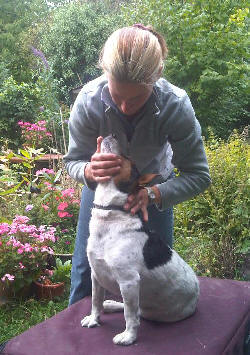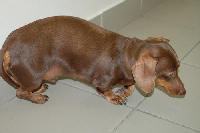How to spot the symptoms...
 Agility
dogs are usually quite athletic but can be prone to injury due to the extra
stresses
put on their bodies.
The most common injuries are soft tissue sprains and strains but more serious
ones like disc lesions that can lead to pinched nerves do occur. It is important
to spot these early to prevent more significant damage. Chiropractor Petra
Langen-Pieters explains how to tell if your dog has a pinched nerve. Agility
dogs are usually quite athletic but can be prone to injury due to the extra
stresses
put on their bodies.
The most common injuries are soft tissue sprains and strains but more serious
ones like disc lesions that can lead to pinched nerves do occur. It is important
to spot these early to prevent more significant damage. Chiropractor Petra
Langen-Pieters explains how to tell if your dog has a pinched nerve.
A pinched
spinal nerve is a painful and quite common situation dogs and humans. There are
a variety of causes for this condition. Pressure on a nerve can be caused by a
disc, bone, muscle or other soft tissue or even a tumour so diagnosis is not
always straightforward.
Quick
treatment is recommended to increase the quality-of-life of your pet, but
luckily, the symptoms are readily apparent to an observant owner. An MRI is the
preferred method of verifying this condition as an X-Ray may not show the cause
or the extent of the injury or disease.
Changes in Movement
Dogs may exhibit symptoms such as a change in gait due to the pain. A
dog may carry itself differently, favour a leg - especially a hind leg - and may
exhibit limited range of motion in affected areas. Typically, dogs will become
much less active and seem reluctant to play. Some dogs suffer intermittently
from the condition and act normally on better days.
 Other
symptoms such as tingling or numbness can't really be seen but they may cause
your dog to lick or even chew a leg or paw and can even result in a lick
granuloma in some cases. Other
symptoms such as tingling or numbness can't really be seen but they may cause
your dog to lick or even chew a leg or paw and can even result in a lick
granuloma in some cases.
Dogs may
also seem to lose coordination when suffering from a pinched spinal nerve. A dog
may walk or lay down with its back arched or may carry its tail differently.
Some dogs even walk on their knuckles when afflicted by this condition.
Pain Vocalizations and Distress
Dogs may begin to make pain vocalisation for no apparent reason --
there may be no wounds, insect stings or bites or other obvious injury. When in
conjunction with changes in movement and behaviour, this may be one of the
clearest signs of a pinched spinal nerve.
In
addition, dogs may whine or otherwise communicate pain and distress when touched
or moved. Typically, pinched nerves occur in the neck or lumbar region. Your dog
may show pain reactions when pressure is applied there.
Behavioural Changes
Some dogs may exhibit acute behavioural changes when suffering from
pinched spinal nerves. General weakness can be a sign of pinched spinal nerves,
compression of the spinal cord or of a more serious medical condition. Some dogs
will seem generally uncomfortable and will constantly fidget when at rest --
this will generally manifest as an inability to lie down or continually
adjusting position. They might also become aggressive when suffering from acute
pain and may growl or bite when handled.
 Contributing
Factors Contributing
Factors
Certain dogs are simply more susceptible to this condition, like
obese dogs and dogs with particular physiologies, like being long and low to the
ground (Dachshunds) or larger breeds like Rottweilers, German shepherds or Great
Danes. Highly active dogs will also be more likely to suffer, while other dogs
may have a familial history of this disease. Some diseases like cancer, a
herniated disc, osteoporosis or Wobbler's Disease, that mainly affects large
breeds, can contribute to pinched nerves in dogs.
Treatment
Mainstream veterinary medical treatment can include anti-inflammatory
medications, pain relievers, muscle relaxants and, sometimes, tranquilizers to
encourage rest. Cage rest may be prescribed for a period of time although this
is obviously not great for the dog but rest is often crucial. In severe cases,
surgery may be necessary. Both chiropractic and acupuncture can help and the
best approach is a combination of treatment.
 For
more information contact: Petra Langen-Pieters BHSAI EBW DC - 07787 514271 or
01932 857782 For
more information contact: Petra Langen-Pieters BHSAI EBW DC - 07787 514271 or
01932 857782
About the author...
Petra Langen-Pieters BHSAI EBW DC has been a Doctor of Chiropractic
for over 17 years and is Registered with the General Chiropractic Council. She
has done postgraduate training in Animal Chiropractic in the USA, Germany and
the UK and is certified by and registered with the International Veterinary
Chiropractic Association. She has been treating animals for over 15 years.
She is
based in Addlestone, Surrey but will travel to areas in Berkshire, Hampshire,
Middlesex and West Sussex.
First published 15th July 2019
|